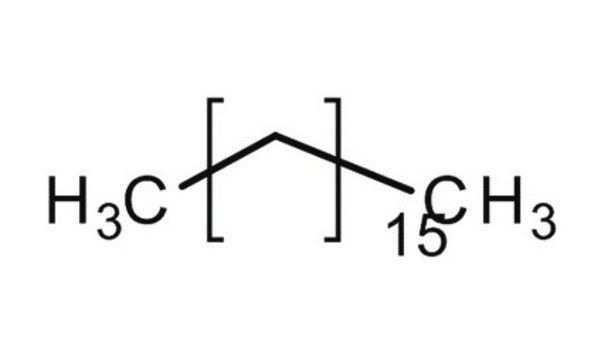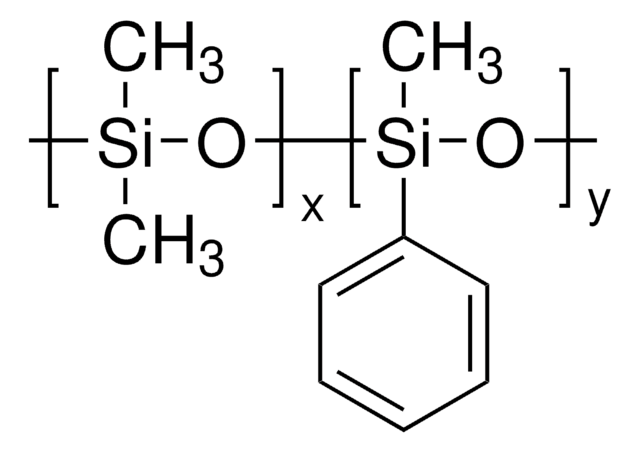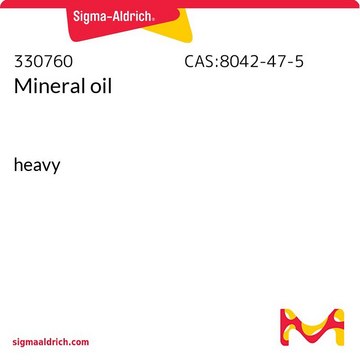All Photos(1)
About This Item
Linear Formula:
CH3(CH2)15CH3
CAS Number:
Molecular Weight:
240.47
Beilstein:
1738898
EC Number:
MDL number:
UNSPSC Code:
12352100
eCl@ss:
32150101
PubChem Substance ID:
NACRES:
NA.22
Recommended Products
vapor density
8.3 (vs air)
vapor pressure
1 mmHg ( 115 °C)
Assay
99%
refractive index
n20/D 1.436 (lit.)
bp
302 °C (lit.)
mp
20-22 °C (lit.)
density
0.777 g/mL at 25 °C (lit.)
SMILES string
CCCCCCCCCCCCCCCCC
InChI
1S/C17H36/c1-3-5-7-9-11-13-15-17-16-14-12-10-8-6-4-2/h3-17H2,1-2H3
InChI key
NDJKXXJCMXVBJW-UHFFFAOYSA-N
Looking for similar products? Visit Product Comparison Guide
Application
Heptadecane was used as an internal standard in the reaction to study the first direct comparison of kava lactone extraction efficiencies. It was also used as the appropriate suspended solvent for the extraction and concentration of EO (essential oil).
Signal Word
Danger
Hazard Statements
Precautionary Statements
Hazard Classifications
Asp. Tox. 1
Storage Class Code
10 - Combustible liquids
WGK
WGK 1
Flash Point(F)
300.2 °F - closed cup
Flash Point(C)
149 °C - closed cup
Personal Protective Equipment
dust mask type N95 (US), Eyeshields, Gloves
Choose from one of the most recent versions:
Already Own This Product?
Find documentation for the products that you have recently purchased in the Document Library.
Customers Also Viewed
A Kubátová et al.
Journal of chromatography. A, 923(1-2), 187-194 (2001-08-21)
Subcritical water extraction of lactones from a kava (Piper metlhysticum) root was compared to a Soxhlet extraction with water, to boiling in water, and to a sonication in acetone. For ground kava (250-500 microm), 2 h of subcritical water extraction
Ikram Djeridi et al.
Extremophiles : life under extreme conditions, 17(4), 669-675 (2013-06-12)
The potential for surfactant production by the extreme halophilic archaeon Haloferax sp. MSNC14 in the presence of individual hydrocarbon substrates was studied. This strain was selected for its ability to grow on different types of hydrocarbons at high NaCl concentrations.
Jiao Jiao et al.
Analytica chimica acta, 804, 143-150 (2013-11-26)
A rapid, green and effective miniaturized sample preparation and analytical technique, i.e. ionic liquids-assisted microwave distillation coupled with headspace single-drop microextraction (ILAMD-HS-SDME) followed by gas chromatography-mass spectrometry (GC-MS) was developed for the analysis of essential oil (EO) in Fructus forsythiae.
S Iqbal et al.
Letters in applied microbiology, 21(3), 176-179 (1995-09-01)
A gamma ray-induced mutant of Pseudomonas aeruginosa strain S8, capable of hyperproduction of biosurfactant from hydrocarbons, was isolated and named as EBN-8. The mutant showed 3-4 times more hydrocarbon emulsification/conversion as compared to the parent when grown on Khaskheli crude
B Patricia et al.
Chemosphere, 38(5), 1157-1164 (1999-02-24)
A microbial surfactant was investigated for its potential to enhance the biodegradation of heptadecane. The bioemulsifier used in this study was extracted from culture supernatants of Pseudomonas nautica after growth on heptadecane. The heptadecane uptake rate-could be increased 15-fold by
Our team of scientists has experience in all areas of research including Life Science, Material Science, Chemical Synthesis, Chromatography, Analytical and many others.
Contact Technical Service











